Niel Bowerman (transfer report) - University of Oxford Department of ...
Niel Bowerman (transfer report) - University of Oxford Department of ...
Niel Bowerman (transfer report) - University of Oxford Department of ...
Create successful ePaper yourself
Turn your PDF publications into a flip-book with our unique Google optimized e-Paper software.
1 Project Description1.1 OverviewMany things in this world are uncertain. Much <strong>of</strong> science is devoted to assessing andreducing these uncertainties, and the field <strong>of</strong> climate prediction is no different. Thereare many types <strong>of</strong> uncertainty in climate prediction (Cox and Stephenson, 2007), andthese can be thought <strong>of</strong> in four broad categories:• Initial condition uncertainty arises from a lack <strong>of</strong> knowledge about the currentstate <strong>of</strong> the weather and climate. On shorter timescales, this is the dominantsource <strong>of</strong> uncertainty.• Process uncertainty arises from our inability to represent all <strong>of</strong> thecomponents <strong>of</strong> the process that drive climate in our models. This type <strong>of</strong>uncertainty is the most difficult to quantify.• Parameter uncertainty is due to our lack <strong>of</strong> knowledge <strong>of</strong> the true values <strong>of</strong>the parameters in our models.• Scenario uncertainty arises because we cannot accurately predictanthropogenic emissions <strong>of</strong> greenhouse gases into the future. On longertimescales <strong>of</strong> the order <strong>of</strong> 100 years, this is the dominant source <strong>of</strong>uncertainty.Much research is currently being done in the field <strong>of</strong> climate prediction, and most <strong>of</strong> itcan be described as quantifying or reducing one or more <strong>of</strong> these types <strong>of</strong>uncertainty. The research that I am undertaking as part <strong>of</strong> my DPhil lies at theinterface between parameter and scenario uncertainty.Until recently, scenario uncertainty was the field <strong>of</strong> social scientists and IPCCWorking Group 3 (WG3). This started to change in 2009 with a series <strong>of</strong> papersintroducing the concept and features <strong>of</strong> cumulative carbon emissions (Allen et al.(2009), Meinshausen et al. (2009), Matthews et al. (2009), Zickfeld et al. (2009)).This concept allows an innovative method <strong>of</strong> simplifying scenario uncertainty, asthese papers show that when considering cumulative emissions, warming is pathindependent.Additionally, Allen et al. (2009) suggest that the uncertainty on warmingis also path independent for a given cumulative emissions total. I will be using theconcept <strong>of</strong> cumulative carbon emissions during my DPhil to explore scenariouncertainty from this new angle.1.2 ExperimentsOver the course <strong>of</strong> my DPhil I have been carrying out experiments exploringuncertainty, and I hope to do several more over the coming two years. I have giveneach experiment a code, which is listed in Table 1. The timetable that I hope t<strong>of</strong>ollow over the coming two years is given in the Gantt chart in Table 2. Here I outlinethese experiments: past, present and future.1.2.1 N1: Simple Model ComparisonMuch <strong>of</strong> my initial work on cumulative carbon emissions has used simple climatemodels. I have employed simple models for their computational cheapness, and als<strong>of</strong>or their ability to <strong>of</strong>fer incites into the processes that govern the behaviour <strong>of</strong> theclimate system. I started my DPhil with a comparison between some simple climatemodels, which is documented in Section 2.3.2. This allowed me an insight intoprocess uncertainty, as it is likely that it was different representations <strong>of</strong> thePage 3 <strong>of</strong> 39


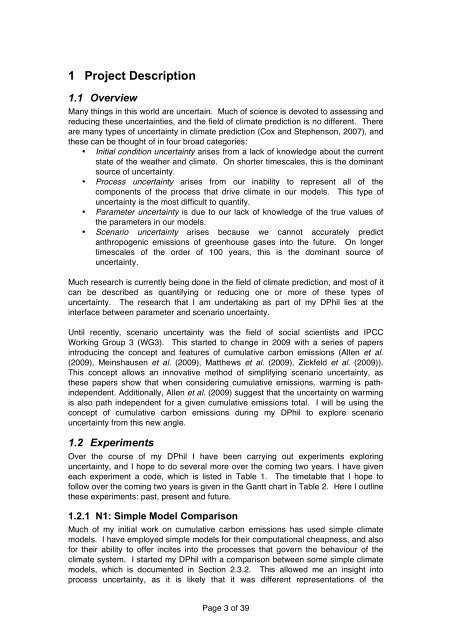
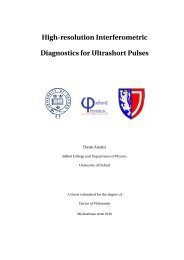
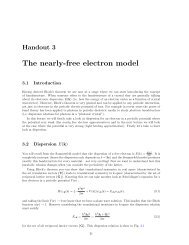



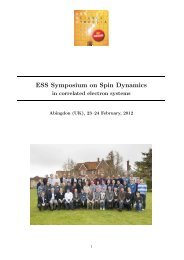
![Extended Notes 8 [pdf]](https://img.yumpu.com/50123548/1/190x245/extended-notes-8-pdf.jpg?quality=85)
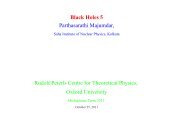
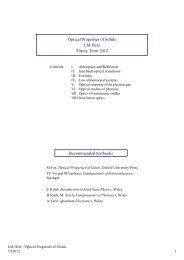
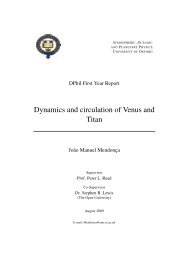
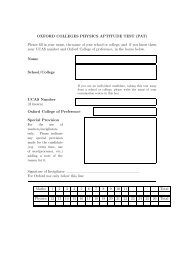
![Handout 3 [pdf] - University of Oxford Department of Physics](https://img.yumpu.com/46475432/1/190x245/handout-3-pdf-university-of-oxford-department-of-physics.jpg?quality=85)